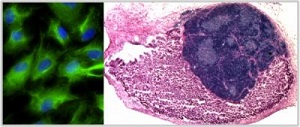 |
| Left: Lab-grown thymus cells were created by cell programming. Right: The thymus cells were then transplanted onto a mouse kidney.--Courtesy of MRC Centre for Regenerative Medicine, University of Edinburgh |
Using reprogrammed cells taken from a mouse, scientists have grown a fully functional organ and successfully transplanted it into a living animal for the first time.
The technique, developed by a team at the MRC Centre for Regenerative Medicine at the University of Edinburgh, produced a working thymus gland--an organ next to the heart that manufactures essential T cells needed to ward off disease. Researchers hope the discovery could eventually help treat people with people with a weakened immune system, who currently have limited therapeutic options available to them.
Investigators used cell programming to turn fibroblasts from a mouse embryo into thymus cells. Once the reprogrammed cells changed shape to look like thymus cells, they became capable of supporting the production of T cells in the lab--a function unique to thymus cells.
After fusing the reprogrammed cells with other important thymus cells, scientists then transplanted the cells into a mouse. This group of cells burgeoned into a working organ with the same structure, complexity and function as a typical adult thymus.
The method, detailed in the journal Nature Cell Biology, marks the first time a whole living organ was made from reprogrammed cells created outside of the body, according to researchers.
Patients with thymus disorders can be treated with infusions of extra immune cells or undergo a thymus transplantation soon after birth, but both these treatment methods are limited by a lack of donors and issues matching tissue to the recipient. The study authors hope their findings could provide the basis for organ regeneration that could eventually be performed in such patients.
- watch the video
- get the press release
- and here's the Nature Cell Biology abstract